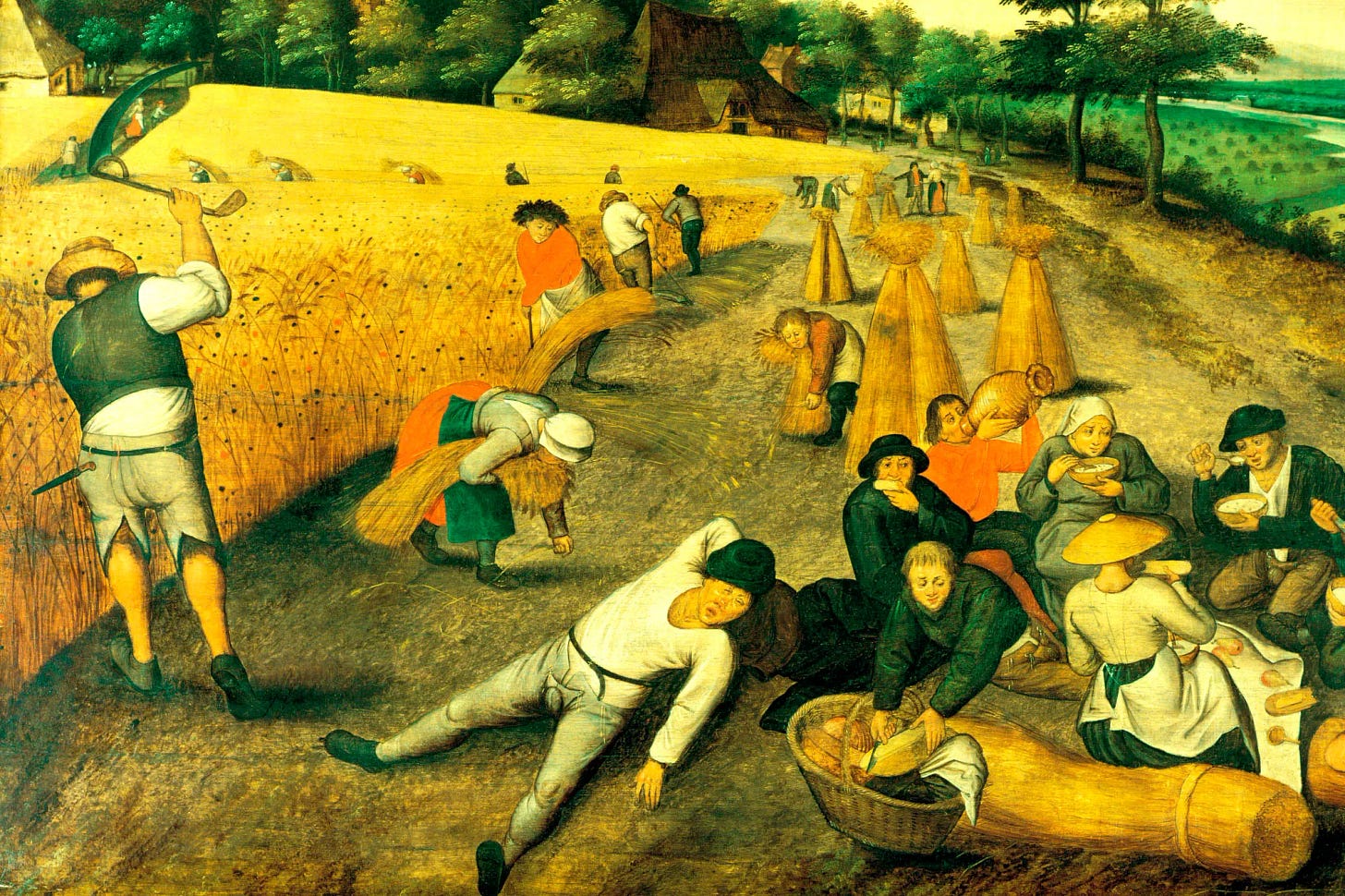Investments are Crucial for Family Life
“Do you have cattle? Look after them; if they are profitable to you, keep them.” -Sirach 7:22
[This essay is an excerpt from my book Catholic Money on the importance of investing. Pope Leo XIII said owning productive assets is crucial for family life. Here I explain why.]
Fruitful Branches
If Divine revelation and the Church’s teaching are the soil and roots of household financial management, then the tree trunk is your life of virtue in self-discipline and diligence as a wise steward, and the branches that bear fruit are your capital investments.
Capital management may seem to be a mystery that only the wealthy can master or comprehend, but that is not true. What is true is that those who have taken the time to learn and develop the skills and virtues of capital management tend to do better financially than those who do not. But that stands to reason. The athlete who drills and disciplines his mind and body for the contest will perform better than those who do not.
It is possible to lose one’s generational capital through unfortunate circumstances beyond one’s control. St. Ambrose says that a man who has lost his inheritance has lost his capital and thus his means of producing an income. He spoke of those who “through loss of their inheritance from no fault of their own… cannot now earn their daily bread.” But that is a different situation from the man who never had any family money and never learned to manage his financial affairs (which is a greater majority of people today).
One of the reasons most people are ignorant of financial skills is because we live in a very complex economy. Keep in mind that before the industrial revolution, most households had their own business(es). Since agricultural production made up about 90% of the economy, this meant working the family farm or the lord’s estate.
Since most people were relatively self-sufficient on their farms, trade was very limited in comparison to today’s commercial activity. Most of today’s owners of productive capital must endeavor to own income producing assets other than farmland.
Most people today do not have enough knowledge, desire, or capital to start or sustain their own business, so they work for someone who does. There is a greater emphasis on intellectual capital, which is not bad. Intellectual capital is the sum of your professional skill sets. Specialized knowledge is very valuable in a complex market environment. At some point, however, most Catholics realize they do not want to trade time for money on a 40+ hour a week schedule until they die.
We desire to govern our own time and follow the pursuits we are most suited to perform. As we get older and start having grandchildren, we also desire space for more leisure — more prayer, more study, more reflection, more time with elderly parents, adult children, and grandchildren, etc. This is a natural, wholesome desire. How is this made possible? The Church encourages families to own and build up assets:
“The essential reason workers engage in gainful employment is to procure property and retain it so that the worker has the means necessary for livelihood. The prudent worker saves a portion of his income by restricting expenditures and invests his savings in some form of capital (productive assets) which gives the worker the hope and the opportunity of increasing his property and of securing advantages for himself” (Pope Leo XIII, Rerum Novarum).
Christian societies have always encouraged ownership of productive assets that provided goods, services, and material means. St. Ambrose exhorts that what we own must be useful to us, not idle: “We possess what we use, but what is beyond our use brings us no fruit of possession, but only the danger of watching.”
When I used to think of the ‘rich’, I had a picture in my mind of the wealthy Uncle Scrooge McDuck ‘swimming’ in his hoard of gold. The reality is that responsible wealthy families do not have a massive stagnant hoard sitting in a vault, but rather own numerous income-producing assets. These are called ‘cash flow’ assets. The ‘money’ of billionaires is not sitting in a vault, it is invested into businesses, commercial and residential real estate, stocks, and bonds. Most of their wealth is not sitting in cash; their capital is at work, producing value for society.
One of the blessings of today’s modern economy is that many of the cash flow assets that used to only be available to upper-class families are now available to anyone with an internet connection and a few dollars to invest.

Owning shares in a publicly traded business or one’s own small business is an exceptionally efficient way to produce income outside of one’s wage earnings and is an excellent use of capital. According to Church teaching, the risk involved in investing capital legitimates a return – a share in the business profits. Some may argue that it is not fair that those with capital are able to make more money than those without capital. These poor souls do not understand the nature of distributive justice.
Distributive justice is the moral principle which governs what the community owes individuals. According to the laws of distributive justice, a person is due just remuneration in proportion to his willingness to assume risk, and the responsibility he carries. For example, it would not be right to pay the pilot of an airplane the same amount as the cleaning crew. The training and responsibility are not equal.
“There are truly very great and very many natural differences among men. Neither the talents, nor the skill, nor the health, nor the capacities of all are the same, and unequal fortune follows of itself upon necessary inequality in respect to these endowments. And clearly this condition of things is adapted to benefit both individuals and the community; for to carry on its affairs, community life requires varied aptitudes and diverse services, and to perform these diverse services men are impelled most by differences in individual property holdings” (Pope Leo XIII).
Universal, egalitarian, state redistribution of wealth is a violation of distributive justice because it does not recognize the natural inequality of objective criteria in human work or individual family resources and needs.
I will not be judged based on how equally I distribute my resources; I will be judged for how diligent I was in developing the gifts God gave me and how well I managed the resources I earn and am responsible for.
The household provider must be productive with his time, skills, and resources. Allocating capital toward income-producing assets renders an enormous financial service to society while at the same time, the family investor greatly benefits. Owning productive assets lightens the burden for wage earners in the family and may eventually enable both fathers and mothers to work at leisure from home, if that is best for their marriage and family life.
[You may be receiving this post as a Way of the Family investment newsletter subscriber. Investment newsletter subscribers will receive posts that address the questions, “Why is it important for families to own productive assets, and what are some ways I can best do that?” Subscribers will also receive timely updates on market trends.]
Manage subscriptions. To manage your subscriptions, click on your Substack profile, then click on “manage subscriptions.” Under “Notifications”, you can decide which newsletters you would like to remain subscribed to. There are four newsletters to choose from: The Way of the Family, Investment Newsletter, Ask Fr. Deacon, and Homilies.
Consider becoming a paid investment newsletter subscribers
Some of the investment posts are for free subscribers and some are for paid investment members only.
Paid investment members ($89/year) will have real-time access to my current stock portfolio allocations, and beginners will receive my 7-step video investment course which will walk you through setting up your own investment accounts and equip you with the principles you need to be a wise Christian investor in the 21st century. This membership subscription is the best way for me to stay engaged with my investment clients—to keep you abreast of the investment decisions I am making based on ever-changing market conditions.
What will free subscribers get? I will be posting previous and future published essays, book excerpts, and blog posts about healthy, holy, thriving family life on a periodic basis and I have podcasts and videos out in cyberspace that need a home as well as my written content, so stay tuned. For now, this is what I imagine:
periodic posts on budgeting and investing, like this one
post comments and join the community
free access to archived published essays, in one place
free access to blog posts, past and future
free access to select book excerpts, past and future
free access to my recommended reading lists for parents
free access to some of my favorite quotes
What does a paid investment membership purchase? ($89/year) In addition to the above:
my 7-step video investment course ($1000 value) for those who want to start investing, but don’t know where or how to begin
access to my real-time stock investment portfolio. See all the stocks positions I currently own in my various portfolios
Get alerts when I make changes to my portfolios
member-only posts on family finance and investing and timely updates on major market news.




